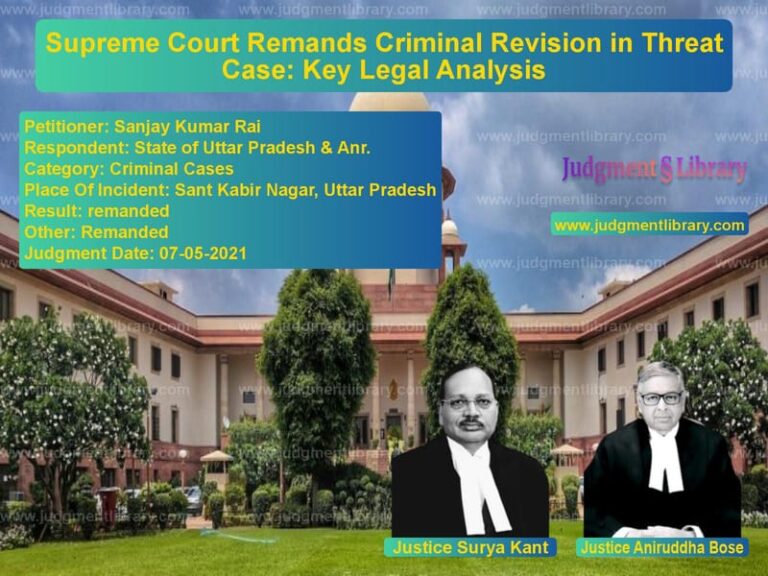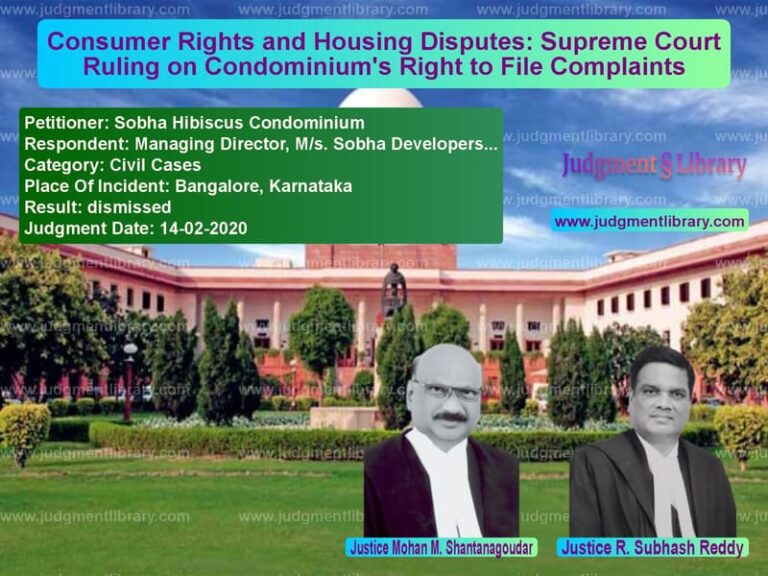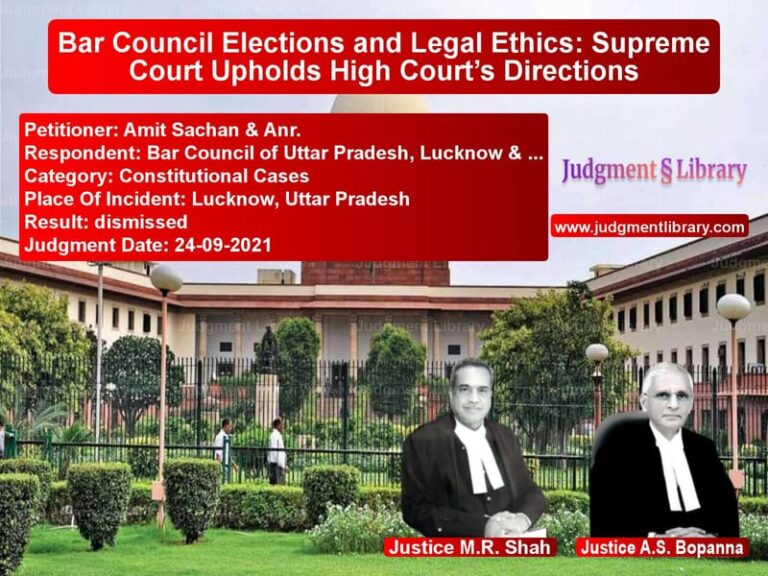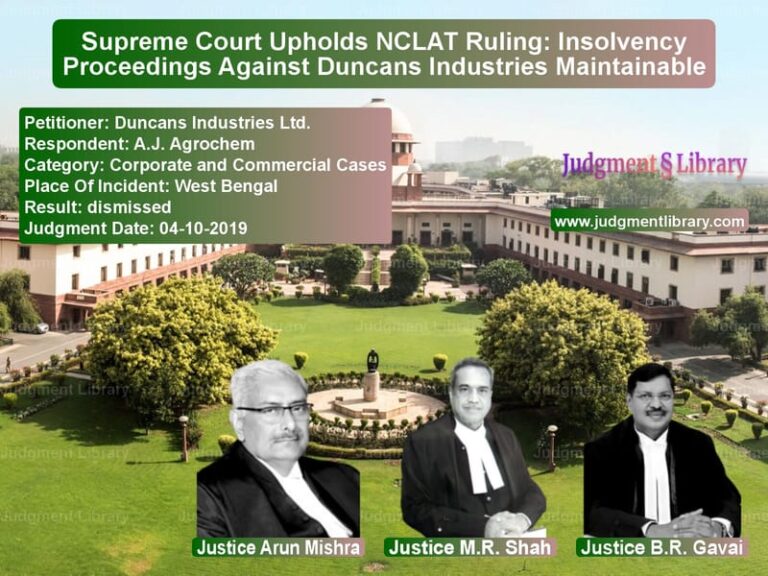Supreme Court Orders Reinstatement of Soldiers Wrongfully Dismissed Over Fake Certificates
The Supreme Court of India recently delivered a landmark judgment reinstating four former soldiers of the Indian Army who had been dismissed from service due to alleged fraudulent enrollment. The Court held that their dismissal was unlawful as the authorities failed to consider their explanation that they were recruited under the general category and had not submitted any false relationship certificates. The judgment has significant implications for military recruitment procedures and the principles of natural justice.
Background of the Case
The appellants, Babanna Machched and three others, had enrolled in the Indian Army under the Unit Headquarters Quota (UHQ) through the Maratha Light Infantry Regimental Centre (MLIRC) in December 2009. After serving for almost three years, they were issued show cause notices alleging that they had obtained enrollment by submitting fake relationship certificates.
The allegations led to the termination of their services. The authorities claimed that these individuals had fraudulently represented themselves as relatives of servicemen or ex-servicemen to secure recruitment under the UHQ quota. Despite their denial, they were dismissed from service on May 9, 2013. Their appeals before the Armed Forces Tribunal (AFT) were rejected, leading them to challenge the decision before the Supreme Court.
Legal Arguments Presented
Arguments by the Appellants:
- The appellants contended that they had applied under the general category and had never claimed any special status as relatives of servicemen or ex-servicemen.
- They asserted that they had not submitted any relationship certificates, and there was no documentary proof showing that they had done so.
- They argued that their dismissal was based solely on an assumption that they had misrepresented their eligibility, without any inquiry proving such a claim.
- The dismissal violated the principles of natural justice as they were not given a fair opportunity to defend themselves.
Arguments by the Respondents (Union of India and Others):
- The respondents maintained that UHQ recruitment was primarily meant for relatives of servicemen and ex-servicemen.
- They argued that the appellants had used fraudulent means to secure enrollment, citing the verification process that allegedly found their relationship certificates to be fake.
- They presented a newspaper clipping announcing the recruitment process, which, according to them, specified that only eligible candidates under the reserved category could apply.
Supreme Court’s Analysis and Observations
The Supreme Court carefully examined the case and found several flaws in the respondents’ arguments:
- The Court noted that the newspaper clipping cited by the respondents was not part of the official recruitment advertisement but a general news report. The Court stated:
“A plain reading of it would reveal that it is not an advertisement inviting applications for enrollment but merely a news item.”
- The Army’s own recruitment guidelines contained a clause (Paragraph 7) that permitted open category recruitment if additional vacancies remained unfilled after accommodating priority candidates.
- The Court found that the appellants’ recruitment forms did not claim any relationship with servicemen or ex-servicemen.
- The dismissal orders did not establish that the appellants had actually submitted any fake certificates, nor was any inquiry conducted to verify the claim.
- The Armed Forces Tribunal had failed to examine whether the appellants had indeed submitted relationship certificates, making their rejection of the appeal legally unsound.
Key Findings by the Court
The Supreme Court concluded that:
- The recruitment under the UHQ quota was not exclusively reserved for the relatives of servicemen but was also open to general category candidates in case of surplus vacancies.
- There was no documentary evidence proving that the appellants had submitted fake relationship certificates.
- The dismissal orders were arbitrary as they failed to consider the appellants’ explanation and lacked proper reasoning.
- The Armed Forces Tribunal erred in upholding the dismissal without scrutinizing the core issue of whether the appellants had falsely represented their eligibility.
The Court emphasized:
“The authorities have not dealt with the explanation given by the appellants. The orders of discharge and dismissal stand vitiated for non-consideration of the material aspect.”
Final Judgment
The Supreme Court set aside the dismissal orders and directed the immediate reinstatement of the appellants with all consequential benefits. The Court ruled:
“The discharge/dismissal order of the appellants is certainly invalid for want of consideration of their specific plea that they had not produced any relationship certificate for selection as they never applied under the reserved category.”
As a result, the appellants were ordered to be reinstated in the Indian Army, with benefits such as salary arrears and service continuity.
Legal Implications of the Ruling
The judgment has significant implications for military recruitment and disciplinary procedures:
- It upholds the principle that candidates cannot be dismissed without substantive proof of wrongdoing.
- It reinforces that procedural fairness must be followed in military recruitment and disciplinary actions.
- It establishes that an employer cannot rely on assumptions or unverifiable claims when making termination decisions.
- It underscores the importance of judicial scrutiny in cases where servicemen are removed based on disputed allegations.
Conclusion
The Supreme Court’s decision in this case reaffirms the fundamental principles of justice and due process in military employment. By reinstating the appellants, the Court has sent a strong message that arbitrary dismissals without conclusive evidence will not be upheld. The judgment also highlights the importance of following fair procedures and ensuring that recruitment decisions are made transparently and in accordance with established rules.
Petitioner Name: Babanna Machched.Respondent Name: Union of India and Others.Judgment By: Justice Bela M. Trivedi, Justice Pankaj Mithal.Place Of Incident: Maratha Light Infantry Regimental Centre.Judgment Date: 09-02-2024.
Don’t miss out on the full details! Download the complete judgment in PDF format below and gain valuable insights instantly!
Download Judgment: babanna-machched-vs-union-of-india-and-o-supreme-court-of-india-judgment-dated-09-02-2024.pdf
Directly Download Judgment: Directly download this Judgment
See all petitions in Employment Disputes
See all petitions in Recruitment Policies
See all petitions in Public Sector Employees
See all petitions in Termination Cases
See all petitions in Judgment by Bela M. Trivedi
See all petitions in Judgment by Pankaj Mithal
See all petitions in allowed
See all petitions in Reinstated
See all petitions in supreme court of India judgments February 2024
See all petitions in 2024 judgments
See all posts in Service Matters Category
See all allowed petitions in Service Matters Category
See all Dismissed petitions in Service Matters Category
See all partially allowed petitions in Service Matters Category







